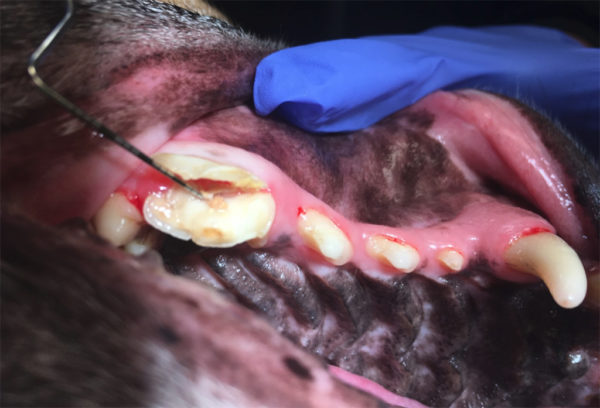Editor’s Note: Healthy Paws is a column sponsored and written by the owners of Clarendon Animal Care, a full-service, general practice veterinary clinic and winner of a 2017 Arlington Chamber of Commerce Best Business Award. The clinic is located 3000 10th Street N., Suite B. and can be reached at 703-997-9776.
Chances are that, in addition to chasing squirrels and keeping watch over the Amazon package delivery man, one of your dog’s favorite pastimes is chewing.
Bones, rawhides, sticks, your most expensive pair of shoes… you name it — your dog can demolish it in a matter of seconds. While chewing is a natural behavior for dogs and a great way to keep them occupied, it is important to remember that their teeth are not indestructible.
Many chewing materials are hard enough to break or wear your dog’s teeth or damage your dog’s gums, putting them at risk of oral pain and infection.
Keep in mind that even if a chew is sold at your local pet store, it doesn’t necessarily mean it is safe. There are plenty of products on the market that have less give than your furry friend’s fragile teeth. Antlers, natural bones and nylon or plastic toys without any flexibility can all cause a tooth to break.
If you would be concerned about breaking your own tooth while chomping on the toy or chew, then you should be equally as concerned about your dog’s teeth. A general rule of thumb to use when selecting an appropriate chew for your pet is to try to bend it with your own hands to see if it has any flexibility and indent it with your thumb. If the chew is too hard to do this, then it is too hard for your dog’s teeth.
In addition to fracturing teeth, some chewing materials can cause significant dental wear as well, which can also eventually lead to pain or infection if the wear extends far enough into the tooth.
The surface of a tennis ball can act like sand paper and wear down teeth over time, especially when it accumulates dirt and sand. Devoted retrievers are more prone to dental wear from the friction of a tennis ball or a Frisbee rubbing against their teeth over time.
If you aren’t sure about the safety of a product, ask your veterinarian before giving it to your pet. You can also access helpful information and approved products from the Veterinary Oral Health Council and the American Veterinary Dental College’s websites.
We suggest a Classic Kong toy appropriate for your dog’s size and age. We recommend spreading a little bit of peanut butter or canned pumpkin on the inside to keep your dog occupied.
Approved rawhide chews are safe only when used under your direct supervision. Your dog should chew the rawhide slowly and soften it as he chews, and you should remove the chew when there is only a small piece remaining to prevent choking or gastrointestinal disease. Happy chewing!



